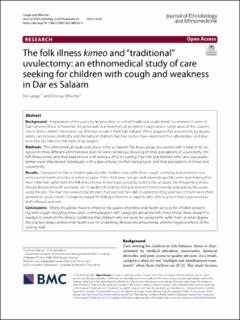The folk illness kimeo and “traditional” uvulectomy: an ethnomedical study of care seeking for children with cough and weakness in Dar es Salaam
Journal article, Peer reviewed
Published version

Åpne
Permanent lenke
https://hdl.handle.net/11250/3039370Utgivelsesdato
2022Metadata
Vis full innførselSamlinger
Sammendrag
Background
Amputation of the uvula by lay providers, so-called “traditional uvulectomy”, is common in parts of Sub-Saharan Africa. In Tanzania, the procedure is a treatment of persistent cough, and in some areas of the country, one in three children have been cut. Previous research from Sub-Saharan Africa suggest that uvulectomy by lay providers can increase morbidity and mortality in children, but few studies have examined the cultural ideas and practices that are linked to this form of lay surgery.
Methods
This ethnomedical study took place in Dar es Salaam. Ten focus group discussions with a total of 43 caregivers in three different administrative districts were carried out, focusing on their perceptions of uvulectomy, the folk illness kimeo, and their experiences with taking a child for cutting. Four folk practitioners who carry out uvulectomies were interviewed individually, with a special focus on their background, and their perceptions of kimeo and uvulectomy.
Results
Caregivers in Dar es Salaam typically take children who suffer from cough, vomiting and weakness to a professional health provider as a first recourse. If the child does not get well relatively quickly, some start fearing that their child may suffer from the folk illness kimeo. Kimeo is perceived by some to be an acute, life-threatening illness that professional health providers are incapable of treating. Folk practitioners treat kimeo by amputating the uvula using forceps. The four interviewed practitioners had learned their skill in apprenticeship, and two of them were third generation uvula cutters. Caregivers regard the folk practitioners as experts who offer a service that is perceived as both efficient and safe.
Conclusions
Efforts should be made to improve the quality of professional health services for children presenting with cough, including more open communication with caregivers about the folk illness kimeo. More research is needed to establish the clinical conditions that children who are taken for uvulectomy suffer from, to what degree the practice delays professional health care for underlying illnesses like pneumonia, and the negative effects of the cutting itself.
